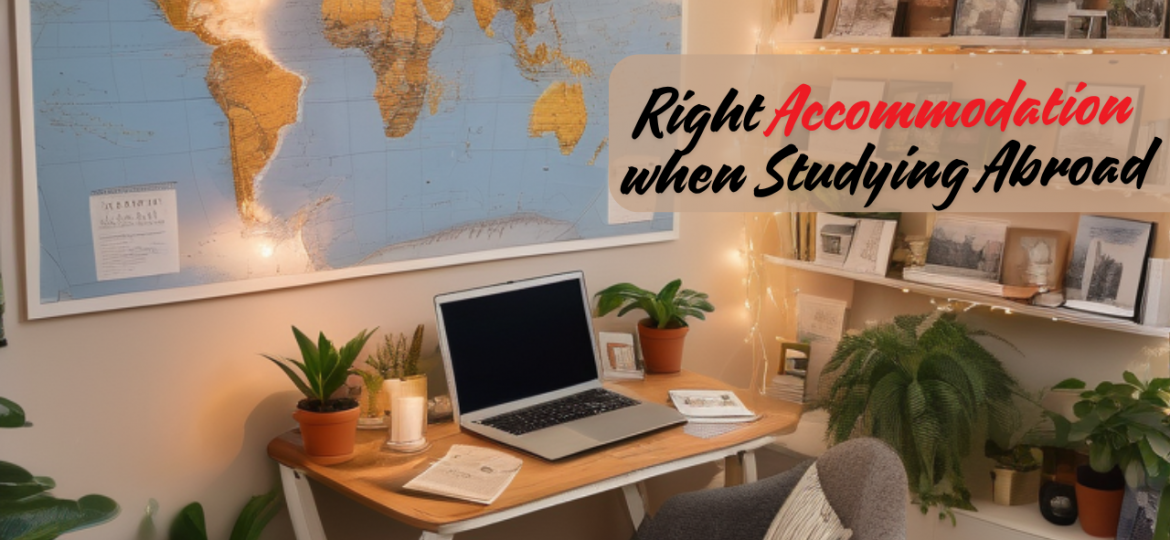
Understanding Long-Term Accommodation Needs While Studying Abroad
Studying abroad is an exciting opportunity that allows you to immerse yourself in a new culture, gain valuable life experiences, expand your educational horizons, and pursue diverse study abroad courses tailored to your academic and personal interests. One of the most important aspects of planning your studying abroad journey is choosing the right accommodation. The place you call home during your time abroad can greatly impact your overall experience. It can provide a sense of security, comfort, and a place to relax and recharge after a long day of studying and exploring. Additionally, your accommodation can contribute to your cultural immersion, allowing you to interact with locals and experience the local way of life.
The Significance of Finding a Comfortable Living Situation
Finding a comfortable living situation is of utmost importance for international students studying abroad. Living in a suitable and comfortable environment can greatly influence the overall experience of studying in a new country. A comfortable living situation provides a sense of security, allows students to relax and recharge, and helps them adjust to their new surroundings. It can contribute to a smoother cultural adjustment process and make the transition into a new country much easier.
Common Types of Student Accommodation Abroad
One option is student residences, which are typically located on or near the university campus. These residences provide a convenient and supportive living environment, allowing students to easily access campus facilities and interact with other students. Student residences often offer shared living spaces, such as dormitories or apartments, and provide a sense of community and social support.
Another option is renting a private apartment. This provides more independence and privacy compared to student residences. Private apartments can be shared with roommates or occupied individually, depending on the student’s preference. Renting a private apartment allows students to have more control over their living arrangements and create a personalized living space.
A third option is staying with a host family. This type of accommodation provides a unique cultural immersion experience. Students live with a local family, sharing their home and daily life. Staying with a host family allows students to practice the local language, learn about local customs, and experience the host country’s culture firsthand.
Read more: Do You Wish To Pursue Your Education Abroad? Check Out These Tips For Studying Abroad In The UK
A Beginner’s Guide to Searching for Accommodation
- Research Accommodation Providers: Explore local housing options through online platforms, university resources, and social media groups. Familiarize yourself with the housing market in your study abroad destination.
- Comparison of Options: Create a list of potential accommodations and compare them based on your criteria. Consider factors like proximity to campus, cost-effectiveness, facilities, and reviews from previous tenants.
- Utilize Online Platforms: Explore websites like StudyAbroad.com or Housing Anywhere for extensive listings and filtering options. Use filters to narrow down choices according to your preferences and requirements.
- Leverage University Resources: Check housing offices or online portals provided by the university for approved housing options and roommate-matching services. Seek guidance from university staff or advisors regarding accommodation choices.
- Thorough Research and Reviews: Read reviews and feedback from previous tenants to gain insights into the quality and reliability of accommodations. Verify the authenticity of listings and ensure they meet your requirements before making a decision.
- Plan Ahead and Stay Organized: Start your search well in advance to have ample time for research and decision-making. Keep track of your options, notes, and deadlines to stay organized throughout the search process.
Step-by-Step Guide to Finding the Right Place
Finding the right accommodation while studying abroad requires a step-by-step approach and careful planning. By following a systematic process, you can ensure a smooth transition and find a place that meets your needs.
Step 1: Identifying Your Preferences and Requirements
The first step in finding the right accommodation is to identify your preferences and requirements. Consider factors such as location, budget, amenities, and living arrangements. Determine if you prefer to live alone or with roommates. Think about your privacy needs, compatibility with potential roommates, and the benefits of sharing a living space. Consider whether you want to live on or off-campus and explore different options such as dormitories, shared apartments, or homestays.
Step 2: Utilizing Online Platforms and University Resources
Once you have identified your preferences and requirements, it’s time to utilize online platforms and university resources. Online platforms dedicated to student housing, such as StudyAbroad.com or Housing Anywhere, provide extensive listings and allow you to filter options based on your preferences. University resources such as housing offices or online portals can provide information on approved housing options and roommate-matching services.
Step 3: Contacting Potential Landlords or Housing Services
After conducting thorough research and narrowing down your options, it’s time to contact potential landlords or housing services. Reach out to the accommodation providers to gather more information about the properties, availability, rental terms, and any additional requirements. Ask specific questions about the property, such as its proximity to your university, amenities provided, and any rules or regulations. If possible, try to connect with previous tenants to gain insight into their experience and satisfaction with the accommodation.
Step 4: Scheduling Visits or Virtual Tours
To gain a better understanding of the accommodation options, it is recommended to schedule visits or virtual tours. This allows you to visualize the living space, assess the condition of the property, and evaluate the surrounding neighborhood. During the visit or virtual tour, pay attention to factors such as cleanliness, safety measures, noise levels, and proximity to amenities. Consider the following during visits or virtual tours:
- Assess the condition of the accommodation and common areas
- Evaluate the proximity to your university and other amenities
- Observe the neighborhood and get a sense of the local culture
- Ask about the availability of parking or transportation options
- Inquire about any additional costs or fees associated with the accommodation
Step 5: Finalizing the Accommodation Agreement
Once you have selected the accommodation that meets your needs, it’s time to finalize the accommodation agreement. This is a crucial step that involves reviewing and signing the lease agreement. Pay close attention to the terms and conditions outlined in the agreement, including the duration of the lease, monthly rent, security deposit requirements, and any additional costs or fees.
Check: Top 3 Ways Study Abroad In USA Helps To Build A Global Career
Navigating Challenges in Finding Long-Term Accommodation
Finding long-term accommodation while studying abroad can come with its challenges. It is not uncommon to encounter a competitive housing market, especially in popular studying abroad destinations.
Dealing with Competitive Housing Markets
In some study abroad destinations, the housing market can be highly competitive, making it challenging to find affordable and suitable accommodation. When dealing with competitive housing markets, consider the following tips:
- Start your search early to have a wider range of options
- Be flexible with your preferences and consider alternative neighborhoods
- Network with local residents or fellow students for recommendations
- Consider shared housing options to reduce costs
- Utilize online platforms and resources dedicated to student housing
- By being proactive and flexible, you can navigate competitive housing markets and increase your chances of finding suitable accommodation while studying abroad.
Understanding and Negotiating Lease Terms
Understanding and negotiating lease terms is an important aspect of finding long-term accommodation while studying abroad. Take the time to carefully review the lease agreement and ensure that you understand your rights and obligations as a tenant. If you have any questions or concerns, seek clarification from the landlord or accommodation provider. When negotiating lease terms, consider the following:
- Rent: Negotiate the monthly rent based on market rates and the condition of the accommodation
- Lease duration: Discuss the duration of the lease and consider your study abroad period
- Maintenance responsibilities: Clarify who is responsible for maintenance and repairs
- Termination conditions: Understand the conditions for terminating the lease agreement
- By understanding and negotiating lease terms, you can ensure a fair and mutually beneficial agreement that meets your needs as a tenant.
Ensuring a Smooth Transition into Your New Home
Ensuring a smooth transition into your new home is essential for a successful studying abroad experience. Moving to a new country and adjusting to a new living environment can be challenging, but with the right approach, it can also be an opportunity for growth and cultural exchange.
Moving In: Checklist for a Hassle-Free Transition
Moving into your new accommodation can be an exciting time, but it is important to be prepared and organized. Create a checklist to ensure a hassle-free transition. Consider the following items for your checklist:
- Pack your personal belongings and essential documents
- Arrange for transportation to your new accommodation
- Complete any necessary paperwork or formalities with the landlord
- Familiarize yourself with the local community and amenities
- Set up utilities and necessary services in your new home
- By following a checklist and being well-prepared, you can make the transition into your new accommodation smooth and stress-free.
Staying Safe and Secure in Your New Environment
Ensuring your safety and security is important when studying abroad. Familiarize yourself with the safety tips and security measures in your new environment. Consider the following:
- Be aware of your surroundings and trust your instincts
- Take precautions such as locking doors and windows
- Understand your legal responsibilities as a tenant
- Learn about the local emergency services and how to contact them
- By taking appropriate safety measures and being vigilant, you can stay safe and secure in your new environment while studying abroad.
Legal Rights and Responsibilities as a Tenant
Understanding your legal rights and responsibilities as a tenant is important when studying abroad. Familiarize yourself with the local housing laws and regulations. Consider the following:
- Understand your rights regarding rent increases, security deposits, and maintenance
- Be aware of your responsibilities as a tenant, such as keeping the property clean and paying rent on time
- Communicate with your landlord or accommodation provider regarding any issues or concerns
- Keep copies of important documents such as the lease agreement and receipts for rent payments
- By understanding your legal rights and responsibilities, you can ensure a smooth and mutually beneficial relationship with your landlord and avoid any legal issues.
Conclusion
Finding long-term accommodation while studying abroad is crucial for a comfortable and successful academic journey. From understanding your needs to budgeting and navigating challenges, a well-prepared search process is essential. Utilize online platforms, university resources, and tools to aid your search. Identify preferences, contact landlords, and finalize agreements carefully. Ensure a smooth transition by following safety tips, understanding legal rights, and creating a checklist for moving in. Stay vigilant with cultural adjustments and roommate/landlord issues.
For a hassle-free experience, stay safe and secure in your new environment. If you need assistance, feel free to get in touch to make your accommodation search a smooth process, study abroad consultancy, and avail of our wide range of services for students on destinations like study in USA, study in Australia, study in Singapore, study in Switzerland, study in New Zealand, study in Germany, study in UK, and many other countries.



